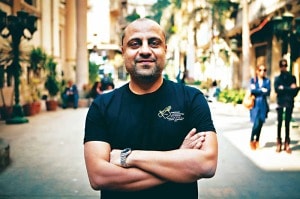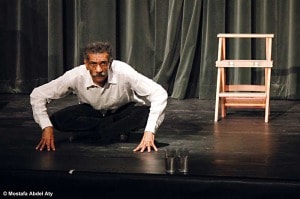In the beginning was the word, and the word was with theatre, and the word was theatre.
You can say that sort of thing in Egypt with no trace of hyperbole. The nation’s long and myriad history stretches back toward the dawn of language, a time when theatre was the cradle of the word, and all other art forms were born out of it.
Theatre as we practice it today—modern theatre, for want of a better term—has its roots in the folk traditions and street performances of 17th-century Egypt. It only became a bona fide, respected art form in the mid-19th century. Theatre went on to blossom in the 20th century when Egypt became the cultural hub of the Middle East; then, with the arrival of the Mubarak regime in the late ’80s, the arts, theatre included, crashed and burned. (For a concise tour of Egypt’s theatrical past, click here.)
Some new life was injected into the theatrical life of Cairo and Alexandria with the rise of independent theatre at the beginning of the 1990s, and the Jan. 25, 2011 political revolution conferred these local efforts with much-needed significance and vitality. Now, with stern censorship looming from the new autocratic regime that is currently being assembled—and the continuous stagnant state of a structureless art form discarded by the government—the future of Egyptian theatre remains perilous.
To make a difficult situation worse, the various theatre festivals that in the past brought international visitors to Cairo and Alexandria—the National Theater Festival, the Experimental Theater Festival and the Dance Theater Festival—all failed to fulfill their initial promise, becoming embroiled in the ongoing corruption. Like most government-sponsored initiatives during the Mubarak regime, the surviving festivals have ultimately become little more than parodies of themselves.
It was in the face of this decay that independent theatre rose, from the ashes of both public and private theatre practices, to challenge the establishment. This independent wave has kept Egyptian theatre afloat, carrying it for nearly 20 years while the traditional art form struggled to find a place in a rapidly evolving cultural scene. And it’s this generation that would plant the seeds for the biggest uprising Egypt has ever witnessed.
 Veteran theatremaker and American University in Cairo (AUC) graduate Ahmed El Attar is director of the downtown Cairo Falaki Theatre, and founder of an important new arts festival known as D-CAF, the Downtown Contemporary Arts Festival. El Attar considers himself part of the independent movement that started out in the late ’80s after Egyptian director Hassan El Geretly founded the pioneering company Al-Warsha(the word in Arabic means “workshop”), which boasted a marquee of immensely talented thespians—among them Abla Kamel, Ahmed Kamal, Mahmoud El Lozy and Sayed Ragab, all of whom have gone on to garner phenomenal success in TV and film, as well as theatre.
Veteran theatremaker and American University in Cairo (AUC) graduate Ahmed El Attar is director of the downtown Cairo Falaki Theatre, and founder of an important new arts festival known as D-CAF, the Downtown Contemporary Arts Festival. El Attar considers himself part of the independent movement that started out in the late ’80s after Egyptian director Hassan El Geretly founded the pioneering company Al-Warsha(the word in Arabic means “workshop”), which boasted a marquee of immensely talented thespians—among them Abla Kamel, Ahmed Kamal, Mahmoud El Lozy and Sayed Ragab, all of whom have gone on to garner phenomenal success in TV and film, as well as theatre.
“The reason why we created D-CAF is because for so long, Egyptians were deprived of theatre,” says El Attar, referring to the Mubarak era’s anti-theatrical stance. “A big part of my learning experience has been watching hundreds of plays from all over the world—this, in many ways, shaped my vision. One reason why theatre lags behind film, music and visual arts in Egypt is the fact that you have access to all of these art forms via different methods. That’s not the case with theatre—you cannot download a play and watch it online. In Egypt, theatremakers don’t see anything except their colleagues’ works. This is why, for instance, the dominant style in independent theatre for more than a decade now is minimal performances, where actors sit around in circles, tell stories and sing. Some artists do it very well, others are abysmal—but at the end of the day, they’re all the same.”
El Attar’s D-CAF festival, now in its third year, is an ambitious attempt to rectify the situation. It presents theatrical productions from around the globe, in addition to musical performances and film screenings. At press time, preparations for D-CAF’s March 20–April 11 third edition were underway in Downtown Cairo. “Zamalek is too posh, Mohandessien is too bourgeois,” El Attar says, referring to Cairo’s famous neighborhoods. “Downtown is a mix of everything—the old bars and local coffee shops, the fancy art spaces and the tacky underwear shops. It has everyone. It’s what a city should be. That you don’t find anywhere else in Cairo.”
The combination of great word of mouth, excellent organization and stellar programming led to a 50-percent increase in audience turnout at last year’s D-CAF, and this year’s line-up boasts original performances from Syria, the Netherlands, the United Kingdom, France and a whopping seven shows from Egypt, including two written by El Attar. “There’s a large audience out there for good art,” the artist-organizer believes. “Young people hungry for something different.”
That hunger became more acute after the watershed moment in 1995 when Cairo’s well-regarded Experimental Theater Festival was abruptly cancelled, propelling Egyptian university troupes and other sponsoring groups to stage their own performances and create their own local versions of the festival. “The previous generation left nothing for us to follow,” observes independent theatremaker Nada Sabet, founder of the artists’ organization Noon Creative Enterprise (NCE). “We were starting with a blank page. We were reinventing the wheel.”
The disappearance of the experimental fest spurred the creation of numerous new performance companies by the likes of Khaled El Sawy, Effat Yehia, Mohammed Abol Soud, now all prominent names in Egyptian theatre. El Attar’s own Temple Independent Theatre Company did not fit into the commercial/private sector or the bureaucratic and torpid state-theatre sector; El Attar resorted instead to performing at foreign culture institutes such as the French Cultural Center and the Swiss Club, and making do with a near-negligible budget. El Attar’s deaf-and-dumb characters, his use of repetition and the lack of inherent logic made his plays a hard sell for a highly conventional theatre that heretofore allowed virtually no room for experimentation.
The stir that this new independent wave caused was quickly noticed by the government, according to theatre director and critic Dalia Basiouny. Cultural officials first lured theatremakers with awards, then with offers of spaces in which to perform, such as the Hanager Arts Theater, a venue that had rigid rules about content and programming that directors could not bypass. “Accepting their awards meant accepting their censorship,” Basiouny attests. Several companies succumbed to being institutionalized and, in time, disbanded.

El Attar has a different view of the censorship dynamic. Despite the fact that his first original text, The Committee, written in the late ’90s, was banned by the French Cultural Center for referencing a real-life military squad named the Donkeys that was active during the 1973 war, El Attar doesn’t believe that Egyptian theatremakers were subjected to censorship during the Mubarak reign. “There’s a big myth about the Mubarak era,” he proffers. “Unlike the era we’re entering into, censorship was not applied to everything. On the contrary, the regime was only concerned with mass media—that’s it. They didn’t care about 2,000 or 5,000 people who would go watch a specific play over five weeks. And it made sense; those numbers are smaller than the population of one street in Downtown Cairo—Cairo is a city of 20 million in a country of 90 million. You did your play; your friends, the old intellectual elite and maybe older Egyptians would go watch it. They [the authorities] simply didn’t bother with you.
“Of course, artists were taking risks. And if the censorship did interfere, they shut down your production,” El Attar continues. “But mostly they allowed us to breathe, I must admit. I’m not defending the regime; I’m simply stating the facts.”
NCE’s Sabet takes her analysis of the field’s problems in a different direction. “For a nation of 90 million, we’re very poor at arts,” she reasons. “The main problem we suffer from is lack of structure—the entire institution of Egyptian theatre lacks structure. Independent theatremakers don’t make money out of their work, so there’s the question of consistency and sustainability, without which you can’t have a proper theatre. In order to sustain your theatre, you need to go the legal route, like I did—but even when you try to do so, pending questions regarding rules and how can you get around them persist.”
The flurry of cultural progress that accompanied the start of the new century in Egypt did not catch up with theatre. The opening of a number of independent performance spaces—Rawabet Theater, Sawy Culturewheel andMakan in Cairo, and the Jesuit Cultural Center and the Bibliotheca Alexandrina in Alexandria—gave young theatremakers the opportunity to present their works without going through the stifling bureaucratic channels of the state institutions, and some artists succeeded in finding their voices, toying with different structures and new forms. But the work did not present a clear artistic path.
“A lot of the works were technically poor,” Basiouny concedes. “Many were not coherent, and writing remains the weakest element in our theatre. There are no proper programs that teach theatre writing. Another problem is that many of those independent groups did not have proper training, and nearly all actors are attuned to the acting style of bad Egyptian soap operas. Yet there was a deep desire to share stories, to express oneself. It was clear that the whole society was on the brink of a revolution, and it showed in different art disciplines, including theatre.”
Sabet agrees with Basiouny’s contention that Egyptian theatre can be “artistically poor.” Even when costly sets are used, she suggests, “they’re used for spectacle rather than for any artistic purposes.” In the waning days of the Mubarak regime, Sabet adds, independent theatres generated a flurry of experimentation with video and multimedia. “But it dwindled away pretty quickly. Now you have video programmers for visual arts, films and live events, but not for theatre.”


